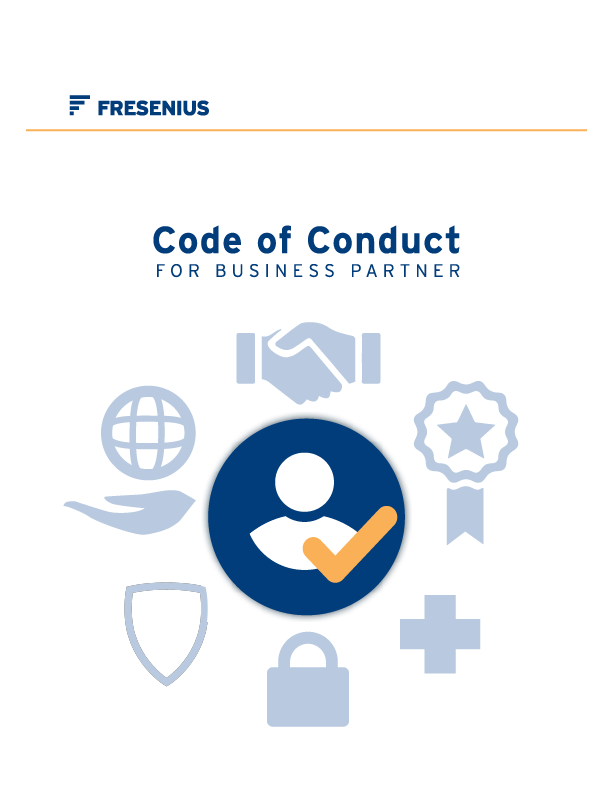Human Rights
Human rights are universal. As a global healthcare company, Fresenius views respect for human rights as an integral part of our responsibility. Medical care for patients and the well-being of our employees are among the most important engagement areas of our human rights due diligence.
Taking responsibility across our value chain
Our focus is on people. We make a significant contribution to providing people around the world with access to healthcare and to manufacturing the required medical technology and devices. This is only possible thanks to the commitment of the more than 175,000 people who make Fresenius a global healthcare group. At the same time, we rely on thousands of people worldwide in our value chain who work for our suppliers and business partners. That is why we are committed to respecting human rights both in our own operations and in our value chain.

The persons and stories depicted in this image are purely fictional. Any resemblance to actual persons is purely coincidental and unintentional.

Anjing and Lisa work on preliminary products which we obtain from our suppliers. In our own production facilities we then process these products further, for example into medical technology that helps treat people in hospitals. We expect our suppliers to respect the human rights principles laid out in our Human Rights Statement and our Codes of Conduct for Business Partners – in both their own activities and in their value chains. This is necessary, as the work of people like Anjing and Lisa, who are deeply involved in our value chain, can give rise to risks or even to violations of human rights. Within the scope of our influence, we are committed to taking appropriate preventive or remedial measures.

Dunya lives with her children next to one of our production sites. Even when she is not working on precursor products or at Fresenius, her human rights must be respected. For instance, Fresenius is responsible for avoiding water and air pollution and excessive noise pollution. This helps maintain the well-being of people like Dunya and her children.

Alejandro works for a logistics company that supports Fresenius in transporting pharmaceuticals and medical technology. As a direct contractual partner, his company is an important part of our value chain. We analyze potential risks for people like Alejandro and initiate additional preventive measures where necessary.

Chi, Benjamín, Shiva, and Carmen work for Fresenius. Despite their different professions and areas of responsibility, they have one thing in common: As their employer, Fresenius is responsible for respecting their human rights in their working environments. This includes ensuring occupational safety by providing appropriate protective equipment when dealing with patients. It also includes ensuring that people like Chi, Benjamín, Shiva, and Carmen are trained in handling equipment or observe, at a minimum, the statutory break and rest periods.
For our millions of patients – like Najuk and Valentina – we do our best every day to keep them healthy. Whether in the hospital, at home or as outpatients, they are part of our value chain. While Najuk is treated in the hospital, Valentina receives our medication at home. The well-being of Najuk, Valentina, and all our patients is at the heart of our human rights due diligence.
The five building blocks of our human rights program
Our human rights due diligence – for our own operations and value chain – is based on five building blocks*:

Human Rights Statement
Fresenius is committed to respecting human rights. We underline this commitment with a Group-wide Human Rights Statement adopted by the Management Board. Our self-commitment is based on the following basic principles that apply to our own operations as well as our value chain:
We are committed to providing a workplace that fosters respect, along with safe and healthy working conditions. We aim to pay fair wages that meet or exceed local industry standards or local minimum wages. Our wage decisions take into consideration the relevant market conditions.1 For this, we comply with the relevant laws and regulations of the place of employment and are guided by international labor standards. We strive to pay remuneration that allows for a decent living for our employees and their families.
Workplace health and safety are fundamental aspects of our operations. We are committed to identifying, mitigating, and preventing occupational health- and safety-related hazards and to fostering a work environment that promotes our employees’ well-being.2
1 Payment of a fair wage at least equal to the minimum wage established by the applicable law; guided by the International Labour Organization (ILO) Conventions 26 and 131.
2 Upholding of occupational health and safety obligations under the laws of the place of employment to reduce risk of accidents at work or work-related health hazards; guided by ILO Conventions 1, 155, and 164.
We respect freedom of association and the right to collective bargaining. This encompasses the rights of our employees to choose freely whether or not to form and/or be represented by a specific collective body or a trade union in accordance with the laws of the place of employment.3
3 Guided by ILO Conventions 87, 98, 135, and 154
No one should be subjected to child labor, forced labor, or any form of modern slavery or slavery-like practices. We condemn and strictly stand against child labor and are committed to respecting and complying with the applicable minimum age for employment.4 We do not tolerate the use or threat of violence or any other form of coercion. We strictly forbid using, supporting, or approving exploitative or forced labor or any form of modern slavery. All employment relationships must be voluntary, and employees have the right to terminate their engagement at any time within a reasonable notice period, in line with applicable laws. Every worker should receive adequate remuneration in exchange for their work or services. Salaries and pay rates shall be fair and comply with the laws of the place of employment. Wages shall not be unlawfully withheld.5
4 Guided by the ILO determinations on the prohibition of child labor below the minimum age according to ILO Convention 138, by the prohibition of the worst forms of child labor according to ILO Convention 182 as well as by the UN Convention on the Rights of the Child.
5 Respect for the prohibition of forced labor, except for work and services that are in conformity with ILO Conventions 29 and 105 or with the 1966 UN International Covenant on Civil and Political Rights.
We do not tolerate any form of discrimination or harassment based on characteristics or attributes protected under the laws of the place of employment, including national or ethnic origin, skin color, social origin, health status, citizenship, disability status, sexual orientation, age, gender, gender identity, gender expression, marital status, pregnancy status, political affiliation, or religious belief. Although the legally protected characteristics differ by place of employment, we fundamentally believe all individuals should be treated fairly and equally.6
6 Guided by ILO Conventions 111 and 159.
We are committed to our joint responsibility to protect nature as the basis of life, to use resources efficiently, and to reduce our impact on the environment as all individuals and communities have the right to live in a clean, safe, and healthy environment.
In all our operations, we aspire to respect the rights and customs of local communities. We are committed to refraining from infringing their livelihood by damaging the soil, polluting water or air, emitting harmful or excessive noise, or using excessive amounts of water, which can have adverse impacts on human well-being. We consider these aspects important as we acknowledge the intrinsic connection between environmental protection and the right to life.
We are committed to not engaging in the unlawful eviction from and takeover of land, forests, or waters which secure the livelihood of people. Instead, we acknowledge that no individual or community should be deprived of their property, land, or access to land and water without proper legal justification or due process.
We do not tolerate the excessive use of force, degrading treatment, or any form of harm to life or physical well-being. Security personnel shall behave exclusively in a preventive, respectful manner and attempt to resolve any security-related matters with non-violent means.
While we hold ourselves to a high standard, we also expect high standards of the third parties we engage with. Hence, we also expect our suppliers and other business partners to uphold human rights in accordance with the principles set out in this statement as well as outlined in the codes of conduct across the Fresenius Group. This includes the implementation of appropriate processes to ensure respect for human rights – also in their value chains. Furthermore, we expect them to refrain from causing, being complicit in, or in any way contributing to the violation of these principles. We expect our suppliers and other business partners to provide evidence on request of how they comply with the human rights principles set out in this statement.
Our commitment is guided by the relevant topics set out by the United Nations Guiding Principles on Business and Human Rights (UNGP) as well as by relevant internationally recognized human rights standards and frameworks, such as the United Nations (UN) Universal Declaration of Human Rights, UN International Covenant on Economic, Social and Cultural Rights, UN International Covenant on Civil and Political Rights, the International Labour Organization (ILO) Declaration on Fundamental Principles and Rights at Work, and the OECD Due Diligence Guidance for Responsible Business Conduct as they apply to our Human Rights Statement. We are committed to complying with applicable national laws such as the German Act on Corporate Due Diligence Obligations in Supply Chains (LkSG).
In cases where international human rights are restricted by local laws, we strive to promote the principles behind the international standards without conflicting with local laws.

“Our commitment to human rights goes beyond legal compliance and rhetoric. It is closely linked to our values and our promise: Committed to Life.”
− Lasse Kowalewski, Head of Group Human Rights Office
Contact
Fresenius SE & Co. KGaA
Else-Kröner-Str. 1
61352 Bad Homburg
Germany
humanrights@fresenius.com
Whistleblowing system
Reports on possible human rights or other types of compliance violations can be reported around the clock, either anonymously or by name, via our whistleblower system*:
Phone number: +49 (0) 800 181 1338*
https://freseniusgroup.ethicspoint.com
More infos about our grievance mechanism
* The prices of your mobile or landline contract apply
Our Human Rights Program
Group-wide Governance & Responsibilities Risk Assessment & Impact Preventive & Remedial Action Grievance Procedure & HandlingRelated Links
Compliance Fresenius Sustainability Highlights Magazine 2024 Sustainability Statement 2024 Human Rights at Fresenius Kabi Human Rights at Fresenius HeliosDownload center
Human Rights Statement (1_EN_0, 198 KB)


The reporting on the respect for human rights for the year 2024 and following can be found in our Sustainability Report (CSRD Report). Further information on Fresenius' human rights program is available on this website.

